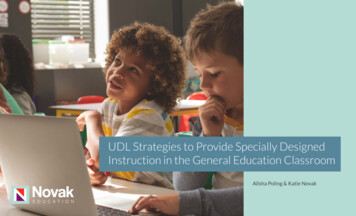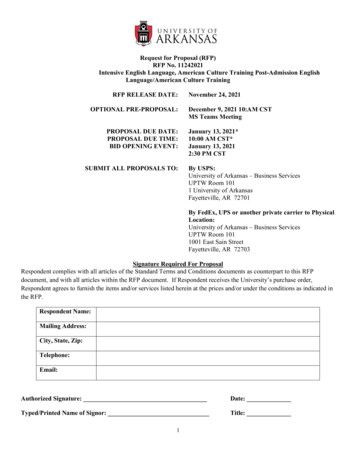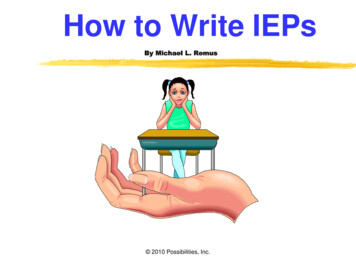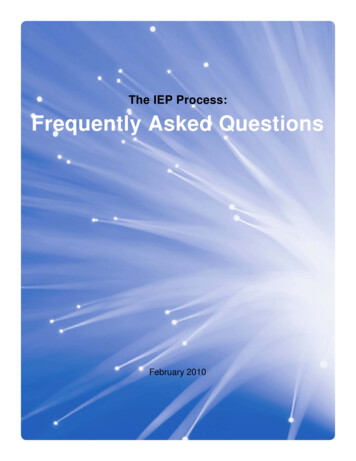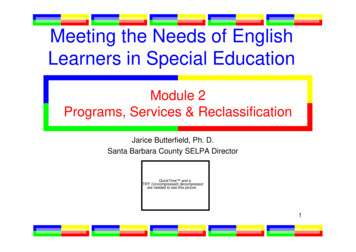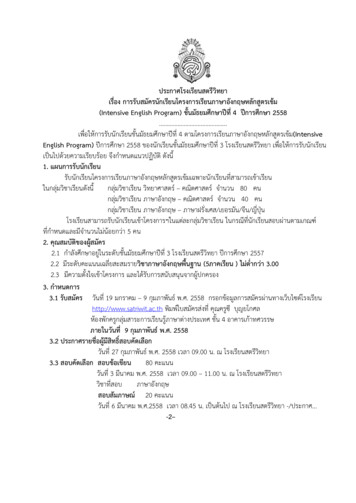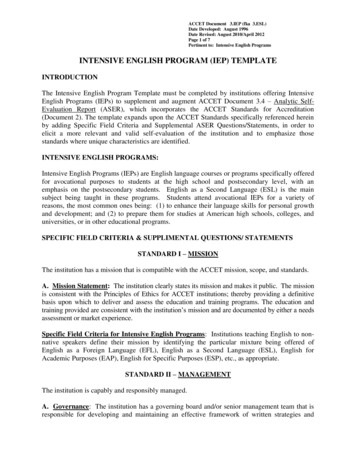
Transcription
ACCET Document 3.IEP (fka 3.ESL)Date Developed: August 1996Date Revised: August 2010/April 2012Page 1 of 7Pertinent to: Intensive English ProgramsINTENSIVE ENGLISH PROGRAM (IEP) TEMPLATEINTRODUCTIONThe Intensive English Program Template must be completed by institutions offering IntensiveEnglish Programs (IEPs) to supplement and augment ACCET Document 3.4 – Analytic SelfEvaluation Report (ASER), which incorporates the ACCET Standards for Accreditation(Document 2). The template expands upon the ACCET Standards specifically referenced hereinby adding Specific Field Criteria and Supplemental ASER Questions/Statements, in order toelicit a more relevant and valid self-evaluation of the institution and to emphasize thosestandards where unique characteristics are identified.INTENSIVE ENGLISH PROGRAMS:Intensive English Programs (IEPs) are English language courses or programs specifically offeredfor avocational purposes to students at the high school and postsecondary level, with anemphasis on the postsecondary students. English as a Second Language (ESL) is the mainsubject being taught in these programs. Students attend avocational IEPs for a variety ofreasons, the most common ones being: (1) to enhance their language skills for personal growthand development; and (2) to prepare them for studies at American high schools, colleges, anduniversities, or in other educational programs.SPECIFIC FIELD CRITERIA & SUPPLIMENTAL QUESTIONS/ STATEMENTSSTANDARD I – MISSIONThe institution has a mission that is compatible with the ACCET mission, scope, and standards.A. Mission Statement: The institution clearly states its mission and makes it public. The missionis consistent with the Principles of Ethics for ACCET institutions; thereby providing a definitivebasis upon which to deliver and assess the education and training programs. The education andtraining provided are consistent with the institution’s mission and are documented by either a needsassessment or market experience.Specific Field Criteria for Intensive English Programs: Institutions teaching English to nonnative speakers define their mission by identifying the particular mixture being offered ofEnglish as a Foreign Language (EFL), English as a Second Language (ESL), English forAcademic Purposes (EAP), English for Specific Purposes (ESP), etc., as appropriate.STANDARD II – MANAGEMENTThe institution is capably and responsibly managed.A. Governance: The institution has a governing board and/or senior management team that isresponsible for developing and maintaining an effective framework of written strategies and
ACCET Document 3.IEP (fka 3.ESL)Date Developed: August 1996Date Revised: August 2010/April 2012Page 2 of 7Pertinent to: Intensive English Programspolicies. This management structure ensures the integrity and effectiveness of the institution andits compliance with statutory, regulatory, and accreditation requirements.Specific Field Criteria for Intensive English Programs: Senior management ensures thatimmigration information, as required by the Department of Homeland Security (DHS) for allnon-immigrant visa holders, is maintained on these students and records are kept confidential,with access restricted to authorized personnel.Supplemental ASER Questions/Statements for Intensive English Programs: Who is the Principal Designated School Official (PDSO) for the organization? How manyadditional Designated School Officials (DSOs) are on staff? How does the institution stay current on immigration issues? Who is responsible formonitoring operations to ensure compliance with DHS regulations? If the institution is regulated, licensed, or approved by a state agency, provide that agency’scontact information. Include a copy of any regulations and/or standards relating to the stateoversight of IEP’s, along with a narrative of how the institution monitors its compliance withsuch standards and copies of documentation evidencing the institution’s compliance with theagency’s regulations and/or standards (e.g. evidence that the institution’s cancellation andrefund policy is consistent with the state’s policy).STANDARD IV – CURRICULAThe institution’s curricular design, materials, and outcomes measurements follow soundeducational practices.A. Educational Goals and Curricular Objectives: The institution’s programs and courseshave appropriate educational goals and curricular objectives. The curricular content and learningexperiences are preplanned and present a sound, systematic, and sequential educationalmethodology. Sufficient and appropriate knowledge and skill elements are included to ensureadequate preparation for the expected performance outcomes in the specific program or coursefor which the students enroll.Specific Field Criteria: All IEPs define specific objectives by sequential performance levels.Each level consists of clearly delineated language skills. Student-to-instructor ratios forprograms are maintained at a level commensurate with the training presented.B. Program/Instructional Materials: Program materials, including syllabi, lesson plans,instructional guides, and texts demonstrate the appropriate scope, sequence, and depth of eachprogram or course in relation to the stated goals and objectives. Instructional materials,including supplementary textbooks, software, learning activities, visual aids, electronic links, andother teaching tools support the goals and objectives. All materials are up to date, readilyavailable, and facilitate positive learning outcomes.
ACCET Document 3.IEP (fka 3.ESL)Date Developed: August 1996Date Revised: August 2010/April 2012Page 3 of 7Pertinent to: Intensive English ProgramsSpecific Field Criteria for Intensive English Programs: All instructional materials are up-todate and appropriate to the institution’s system of sequential performance levels. Instructionalmaterials address the cultural diversity and differences in learning styles among the institution’spopulation.C. Performance Measurements: Performance measurements are written and are periodicallyevaluated and updated to ensure instructional effectiveness. The institution has a sound, writtenassessment system that contains a set of defined elements, such as a grading scale, weightingfactors, tests, quizzes, reports, projects, attendance, and participation, that are appropriatelyrelated to the performance objectives of the program or course.Specific Field Criteria for Intensive English Programs: Both initial assessment andproficiency exams are employed for the evaluation of performance standards. A valid andreliable instrument is used for the initial assessment of all enrollees for placement intoappropriate levels. A valid and reliable test instrument that is nationally recognized is also usedfor an external validation on the acquisition of language proficiency, at a minimum, infulfillment of the institution's exit requirements.Supplemental ASER Questions/Statements for Intensive English Programs: Which testing instrument is used for initial assessment to determine the applicant's Englishskills for placement into skill levels? If this instrument was developed in-house, describe theprocess by which it was developed. Either way, explain how test results are correlated to theproficiency levels embodied in the institution's own system of sequential performance levels. Provide a clear statement and documentation of the institution’s use of in-house achievementexaminations and outside proficiency examinations and any relationship between the twoexaminations.D. Curriculum Review/Revision: The institution uses systematic and effective procedures tocontinuously monitor and improve the curriculum. The written procedures include solicitingfeedback from relevant constituencies, such as faculty, students, graduates, employers, andadvisory/certification boards, as well as analysis of completion, and, if applicable, placementresults. The procedures focus on a comprehensive review of the curriculum as it relates to theexpected learning outcomes.Specific Field Criteria for Intensive English Programs: Policies and procedures exist in thecurricular review process ensuring that current methodologies, theories, and materials areexamined.STANDARD V – INSTRUCTIONAL DELIVERYThe institution utilizes appropriate and effective instructional methods and other resources toensure sound instructional delivery.
ACCET Document 3.IEP (fka 3.ESL)Date Developed: August 1996Date Revised: August 2010/April 2012Page 4 of 7Pertinent to: Intensive English ProgramsA. Instructional Methods: Instructional methods encourage active and motivated responses fromparticipants. Written policies and procedures are in place to ensure that the curricula are followedand that there is consistency of application by all instructional staff. The instructional methodologyis consistent with current training industry standards and appropriate to the educational goals andcurricular objectives, facilitates learning, and serves the individual learning needs and objectives ofparticipants. Instructional methods provide encouragement, motivation, challenges, and learningopportunities for all participants, taking into account different backgrounds, learning abilities andstyles, and prior levels of achievement.Specific Field Criteria for Intensive English Programs: Instructional methods includeinteractive teaching strategies that recognize various modalities of learning (i.e., visual, audio,and kinesthetic), learning styles, and cultural backgrounds. Instructors demonstrate knowledgeof students’ learning styles and are able to modify instruction as appropriate. Institutions employclassroom methods in which instructor use of language is minimized and student use of languageis maximized.B. Externships/Internships: When required as a part of a program, an externship/internship orother training-related work experience is based on a preplanned outline of the specific knowledge,skills, and experience to be acquired. Written policies and procedures for the supervision andevaluation of externships/internships are established and followed by the institution to ensureconsistency and effectiveness. The institution provides a sufficient number of sites to ensureappropriate and timely learning experiences in its externship/internship program.Specific Field Criteria for Intensive English Programs: In accordance with SEVP regulation,no externship/internships may be conducted as part of the institution’s course/program offeringsto non-immigrant students under the institution’s Form I-20.STANDARD VI - INSTRUCTIONAL PERSONNELThe institution ensures that qualified instructors, under professional and capable direction,effectively deliver educational and training services.A. Qualifications of Instructional Personnel: Instructional personnel possess the appropriatecombination of educational credential(s), specialized training and/or certification, work experience,and demonstrated teaching and classroom management skills, which qualifies them for their trainingassignments. Instructional personnel meet all relevant accreditation, federal, state, local, and/orindustry-specific requirements.Specific Field Criteria for Intensive English Programs: The institution maintains writtenpolicies that define the minimum levels of education, training, and experience required ofinstructors. Instructional staff must have at least: (1) a bachelor’s degree with at minimum ofthree months of full-time equivalent ESL or foreign language classroom teaching experience or(2) a bachelor’s degree along with a certificate in teaching ESL or a foreign language, thatincludes a practice teaching component. The institution maintains written policies that define the
ACCET Document 3.IEP (fka 3.ESL)Date Developed: August 1996Date Revised: August 2010/April 2012Page 5 of 7Pertinent to: Intensive English Programsminimum levels of education, training, and experience required of instructors.staff also demonstrate near-native proficiency in English.InstructionalC. Instructor Orientation and Training: The institution develops and implements a writtenpolicy for the effective orientation and training of instructional personnel to ensure a consistent,high level of instruction. The institution also develops and implements an effective written policyfor the ongoing professional development of instructional personnel that is systematicallyimplemented, monitored, and documented.Specific Field Criteria for Intensive English Programs: Continuing education and in-servicetraining include in-house workshops and seminars as well as membership in regional and/ornational professional organizations. Reasonable provisions are made for faculty to attendconventions, meetings, and workshops held by these organizations. Participation is documented.STANDARD VII – ADMISSIONS AND STUDENT SERVICESThe institution recruits and enrolls only qualified participants who can reasonably be expected tobenefit from the education and training services and provides student services appropriate totheir needs.A. Recruitment: Informational and promotional materials, advertising, and representationsmade by or on behalf of the institution for recruiting purposes make only justifiable and provableclaims regarding the courses, programs, costs, location, instructional personnel, student services,outcomes, and other benefits. All communication with prospective students is ethical andhonest. The institution does not state or imply that employment, occupational advancement,and/or certification and licensing are guaranteed.Specific Field Criteria for Intensive English Programs: IEPs that recruit the majority of theirstudents from outside the United States use marketing/sales methods that may include theestablishment of overseas admissions offices; appointment of counseling agents; attendance ateducational fairs; and/or advertisement in print media, websites, radio and/or television.Supplemental ASER Questions/Statements for Intensive English Programs: Describe all of the communication channels through which potential students receivepromotional literature (e.g., personal contacts, advertising, official organizations, public fairs,the educational establishment, web sites, and overseas representation). Does the institution make use of recruiting agents in other countries? Describe therelationship between the institution and the agent, including the type of agreement signed. How does the institution ensure its compliance with DHS regulations regarding therecruitment and admission of international students?
ACCET Document 3.IEP (fka 3.ESL)Date Developed: August 1996Date Revised: August 2010/April 2012Page 6 of 7Pertinent to: Intensive English ProgramsB. Enrollment: The institution’s written policy for enrollment is clearly stated, defined, and incompliance with statutory, regulatory, and accreditation requirements. Reliable and regular meansare utilized to ensure that, prior to acceptance, all applicants are able and qualified to benefit fromthe education and training services. The enrollment process is preplanned, effective, and regularlymonitored by the institution to ensure its integrity.The institution provides in its written enrollment agreement or contract full disclosure of the rights,obligations, and responsibilities of all parties, including (1) all costs stated in clear and explicitlanguage, and (2) cancellation and refund policies that comply with statutory, regulatory, andaccreditation requirements. The enrollment agreement or contract is furnished to appropriate partiesbefore any payment or obligation is made.Specific Field Criteria for Intensive English Programs: The institution's enrollmentdocuments (including enrollment agreements and catalogs, as applicable) are provided in alanguage the student understands, or the institution verifies and attests that the translated contentis understood by the enrollee. IEPs that are strictly avocational in nature, as a general procedure,do not require students to sign separate enrollment agreements, but rather, a combinedapplication/enrollment agreement form.Supplemental ASER Questions/Statements for Intensive English Programs: How does the institution ensure that students understand their obligations under the studentvisa program?D. Student Services: Student services, consistent with the mission and learning objectives ofthe institution, are provided, such as academic advising, tutoring, placement assistance,extracurricular activities, and housing, as applicable.Specific Field Criteria for Intensive English Programs: The institution provides a broadrange of student support services such as housing, cultural orientation, and activities, etc.Supplemental ASER Questions/Statements for Intensive English Programs: Provide sample promotional literature that describes the student services offered. Describe housing assistance that the institution provides to students in arranging homestays,campus housing, apartments, or other housing arrangements. Describe the process forsecuring, assessing, and continually evaluating student housing. Who is responsible for thesetasks? How does the institution verify student satisfaction with their accommodations?Provide sample documentation. Does a member of the administrative staff provide assistance to those students who wish tocontinue their studies in American universities or vocational programs? If so, describe theassistance given in choosing the appropriate program and site as well as that given with theapplication process.
ACCET Document 3.IEP (fka 3.ESL)Date Developed: August 1996Date Revised: August 2010/April 2012Page 7 of 7Pertinent to: Intensive English Programs Describe orientation activities conducted both prior to arrival and on-site. How does theinstitution assist students through their stay with problems arising from linguistic breakdown,cross-cultural differences, or overly high or false expectations? Does the institution assiststudents' cultural adjustments to living in the United States by providing orientation (bothwritten and oral) to students regarding local laws, the community, and academic policies andprocedures including level placement, attendance, advancement and dismissal? Provide a copy of the information the institution disseminates to students about healthinsurance.STANDARD VIII – EVALUATIONThe institution utilizes appropriate methods of evaluation to ensure that outcomes are consistentwith the mission and goals. The institution maintains all required documentation.A. Student Progress: The institution effectively monitors, assesses, and records the progress ofparticipants utilizing a sound assessment system with a set of defined elements that areappropriately related to the performance objectives of the programs or courses. Semester credits,quarter credits, clock hours, and/or continuing education units are used to denote the successfulcompletion of the education and training services. Student progress is documented consistently inaccordance with institutionally established performance outcomes and is communicated to allparticipants. Participants are informed of their progress on a regular and timely basis. Institutionspublish clear descriptions of their requirements for satisfactory student progress and utilize soundwritten policies and procedures to determine student compliance with these requirements and todocument the results.Specific Field Criteria for Intensive English Programs: The institution has a written policythat determines whether a student is making satisfactory progress and is in good standing.Assessment standards include documentation of both the in-house and external standardizedexaminations. Students’ progress to the next performance level is determined by the institution’sprescribed measures of competency, which must include reading, writing, listening, andspeaking.Supplemental ASER Questions/Statements for Intensive English Programs: Describe the institution’s satisfactory progress policy and what it means to be in “goodstanding.” Demonstrate that the policy has been implemented and is enforced. State the criteria used for determining a student's eligibility for advancement to the nextperformance level in terms of observable performance objectives. Indicate the impact on the overall grade/assessment of both in-house achievement exams andexternal proficiency exams.
intensive english programs (ieps) are english language courses or programs specifically offered for avocational purposes to students at the high school and postsecondary level, with an emphasis on the postsecondary students. english as a second language (esl) is the main subject being taught in these programs.
